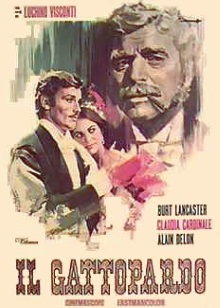
This Italian film can be considered a classic but I don’t think it is that well known and I only knew about it from a post on Broken Forum. As it cost so much to make they needed American money to fund it and so, unusually, it stars an American actor, Burt Lancaster, in the titular role. All of Lancaster’s lines are therefore dubbed. As the choice of male lead was forced on director Luchino Visconti, the result should have been a disaster, yet all seems to have turned out well.
Don Fabrizio Corbera is the Prince of Salina in Sicily and patriarch of his household. Giuseppe Garibaldi has landed his volunteer soldiers to fight for a unified Italy and many of the aristocrats are nervous. The Prince is calm however and indeed his favored nephew Tancredi has joined the rebels and distinguishes himself in battle at Palermo. Despite the troubled times, the Prince insists on sticking with his usual routines and takes his household to his summer palace at Donnafugata. There he finds that a leading citizen Don Calogero Sedara has gained immense wealth and influence under the new regime though he continues to evince great respect for the Prince. Though Tancredi is romantically involved with his own daughter, the Prince immediately sees that Tancredi will marry Calogero’s beautiful daughter Angelica. Though Tancredi is of noble lineage, his family’s fortunes have declined so the marriage will replenish the family’s coffers while conferring the aristocratic legitimacy that Calogero greatly desires.
Neither of us are familiar with Italian history so it can be quite difficult to understand what is going on in the film when you don’t know who the rulers of Sicily are at that time and what Garibaldi achieved. The gist of the film however remains clear. It is the portrait of a wise and canny nobleman who sees the changing of the times and does what he has to do to survive so that his family can maintain their luxurious lifestyle. As he says to the Jesuit priest who is assigned to his family and fears the changes, it is inevitable that the middle class will rise to become part of the ruling class so the best that they can do is compromise with them so that life can go on. Even so, the Prince remains proud and clear-eyed, refusing to become a senator in the new Italian government as he is skeptical of their ability to improve life for the peasantry in Sicily. Tancredi on the other hand is the exact opposite, being enthusiastic and passionate as a member of Garibaldi’s volunteer army but once he has earned enough respect he doesn’t hesitate to change sides to join the regular army instead and later even condemns the rebels for wanting to ferment more chaos.
In addition to being a historical epic, The Leopard also serves as wealth porn and I’m amused to how alike it is to Crazy Rich Asians in highlighting the contrast between old money and new money. The film opens with the family praying privately in a sumptuously appointed hall. It ends with an interminably long ball scene in a mansion which has Calogero crassly comment that places like this aren’t built any longer due to how expensive gold is. Another way that the film shows how incomprehensibly rich these aristocrats are is that they apparently own a huge mansion in which no one has ever lived and though run-down is filled with portraits and fine furniture. Tancredi explains that it was built just as a place for family members to have liaisons. In between there are fantastic shots of the Sicilian countryside. There are some shots of how poor the peasantry is as well and it’s notable how it shows that the Prince is well aware of their living conditions but appears to behave as if this is part of the natural order. The cinematography is exquisite throughout, all the better to show off the richness of the decor.
Without the requisite background knowledge, we probably didn’t fully appreciate everything that is in this film. It’s odd for example how Garibaldi is constantly talked about but never seen in this film and it’s hard to keep track of the changing attitudes towards him. The Prince’s comments about Sicily are also probably important in a way that we can’t fully grasp. All the same, I found this film to be both incredibly rich and highly informative, leading me to read up more on the history of the period. The character of the Prince is also fascinating, being a sophisticated, highly intelligent and canny nobleman who has an undeniable sense of honor and yet is unapologetic about the privileges of his class. For sure, he’s a character doesn’t fit any of the usual, modern molds. I may not have heard of this film before this but it certainly counts as a true classic.